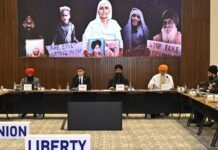India Post News Service
On Thursday, April 29, Santa Clara County, California held a public hearing on caste-based discrimination. HAF’s executive director Suhag Shukla and managing director Samir Kalra were among many Hindu American community members testifying. The following are their statements entered into the public record.
Testimony of HAF executive director Suhag Shukla:
“My name is Suhag Shukla. I’m a Santa Clara County native and now serve as the Executive Director and Legal Counsel of the Hindu American Foundation. Thank you for this opportunity to speak on this critical and complex issue. I was born in O’Connor Hospital and was a Fremont Union School District student from kindergarten all the way to 12th grade. Little could I have ever imagined that the biggest stereotype that I dealt with growing up in this county decades ago, would be an agenda item in the very same county and under consideration for implementation as a matter of policy.
“To the Commission: we share your admirable goals of standing up for human rights and eliminating prejudice and discrimination. We too strongly condemn all forms of discrimination including caste-based discrimination.
“To those who testified about specific incidents of caste-based discrimination at work and school, such incidents should be brought to light, thoroughly investigated, and rectified. And where they can be rectified is under existing law, and by extension existing county and company policies. The solution to addressing caste-based discrimination is not in the creation of caste as a specific category, but rather enforcing existing law, educating people of their rights, ensuring companies are compliant with their legal obligations, and cultural competency training as our communities and companies grow increasingly diverse.
“Discrimination based on national origin is already prohibited under US law and discrimination on both national origin and ancestry are prohibited under California state law and county policy. National origin, ancestry, and ethnicity have all been interpreted by the courts to include birthplace, ancestry or lineage, cultural background, or linguistic characteristics — all of which may be characteristics of caste. Caste is not race — this theory is itself rooted in racist theories devised by white Europeans about the dark heathens of the Indian subcontinent in the early 19th and 20th centuries.
“The power of existing law to provide protection against discrimination and mete out justice in its wake is that all classes are generally applicable and facially neutral. Caste is not.
“Caste is a stereotype uniquely associated with Indians and Hindus. By considering this proposal, you will uniquely target and South Asians, Indians, and Hindus for ethno-religious profiling, monitoring, and policing. The idea that caste is a state of mind, as suggested by Professor Brown, is counterfactual. No one is going raise caste as either a claim or question in conflicts between two white people, two Latinos, two African Americans, or people of non-South Asian backgrounds.
“The unintended consequence is simple. The Commission through this proposal is considering jeopardizing the well-being, safety, and rights to equal protection and due process of thousands of people of South Asian origin working or living in Santa Clara County. The Commission instead of solving a problem is creating a new one by unconstitutionally marking an entire religious and ethnic minority as a suspect class on the basis of its national origin, ethnicity, ancestry, or religion.
“No one should be discriminated against, so do the right thing. Enforce existing law and invest in cultural competency rather than profiling a community on the basis of their national origin, ethnicity, ancestry, or religion.”
Testimony from HAF managing director Samir Kalra:
“Good Evening Commissioners, my name is Samir Kalra and I’m a Santa Clara County native. I was part of a group that led the Sunnyvale City Council redistricting initiative in 2019 to empower Asian American voters, and I also serve as managing director of the Hindu American Foundation. Thank you for the opportunity to speak on this important issue.
“While we understand that you are treating this as a fact-finding forum, we are concerned about further actions and recommendations that may be considered and have already been proposed by most of the panelists of whether to add caste as a separate anti-discrimination category. It’s therefore of the utmost importance that we discuss the potential ramifications of these actions now and before it becomes too late.
“The US Constitution guarantees equal protection under the law. Creating a category that marks only a single group out is the exact opposite. Caste is unlike any of the other non-discrimination categories – it is not broad, universal, or facially neutral. Any consideration of caste as a separate stand-alone category would put a target on the backs of all people of Indian origin, regardless of their caste.
“We are against all discrimination against Dalits or anyone else in the workplace and in schools. We believe all should be treated equally. India’s indigenous religions – Jainism, Hinduism, Buddhism and Sikhism, all in their diverse ways, believe in the inherent equality of all people. Adding caste as a protected category will result in more inequality because it will bring the British created legal category of caste when it is not an identity we want to keep as it was forced on South Asians.
“A certain group, religious or ethnic, should not be branded and therefore made a suspect class. Adding a category of caste would do just that.
“How would Santa Clara County define what caste is in the first place where there is no precedent in American law? If you ask 100 people what caste is, you will get 100 different answers, including amongst scholars. How will Santa Clara County and companies for that matter go about determining what someone’s caste is? Will you keep a long database of our names and add a category for caste? Will you force individuals to wear some type of patch or armband that identifies our caste?
Or force us to carry a specific identification card or certificate? And for those who don’t know anything about their caste will you force one upon them? And how will you decide? Import Indian legal categories, which include thousands of caste categories? Because caste is not readily apparent from appearance nor name for that matter. By adding a protected category you would actually be further crystalizing and making caste identities rigid, rather than moving away from it These are the very real implications and questions you must consider before taking action or making recommendations on an issue that is still not well understood in the US.
“There is no concrete or reliable data on the extent to which caste based discrimination may or may not be taking place in Santa Clara County, and whether it is a widespread problem or not. Even if it is, Santa Clara County should find a solution that is facially neutral and universally applicable to provide protection.
“Is this Commission holding similar forums or considering taking new actions or making policy recommendations for any issues of discrimination based on tribal, clan, sect, or social class affiliation from different racial and ethnic groups in Santa Clara County? If they came to you with some examples but without any concrete data, would you similarly take action, as you are here by generalizing and stereotyping the entire Indian and Hindu communities? Is the commission going to investigate the many social classes, clan, tribe, or sect affiliation in Middle eastern and other communities next? Shouldn’t we instead focus on ensuring that our current anti-discrimination policies, protections, and laws are enforced effectively and equally regardless of someone’s background.”







